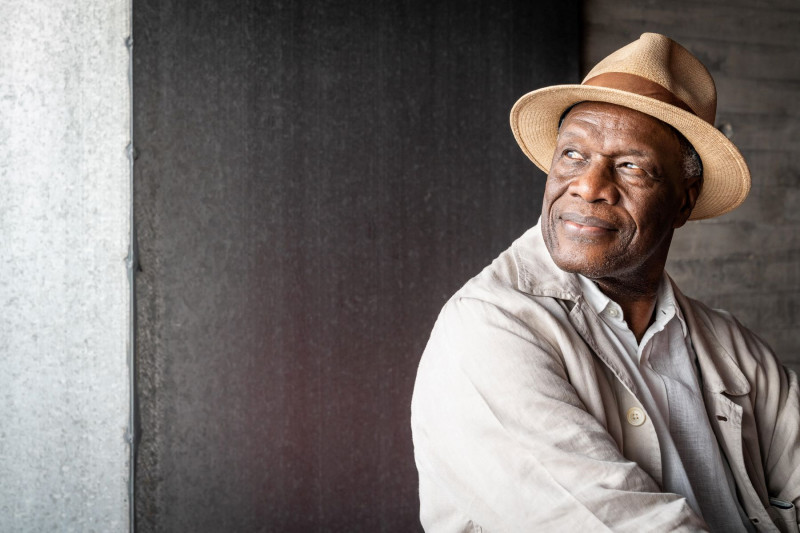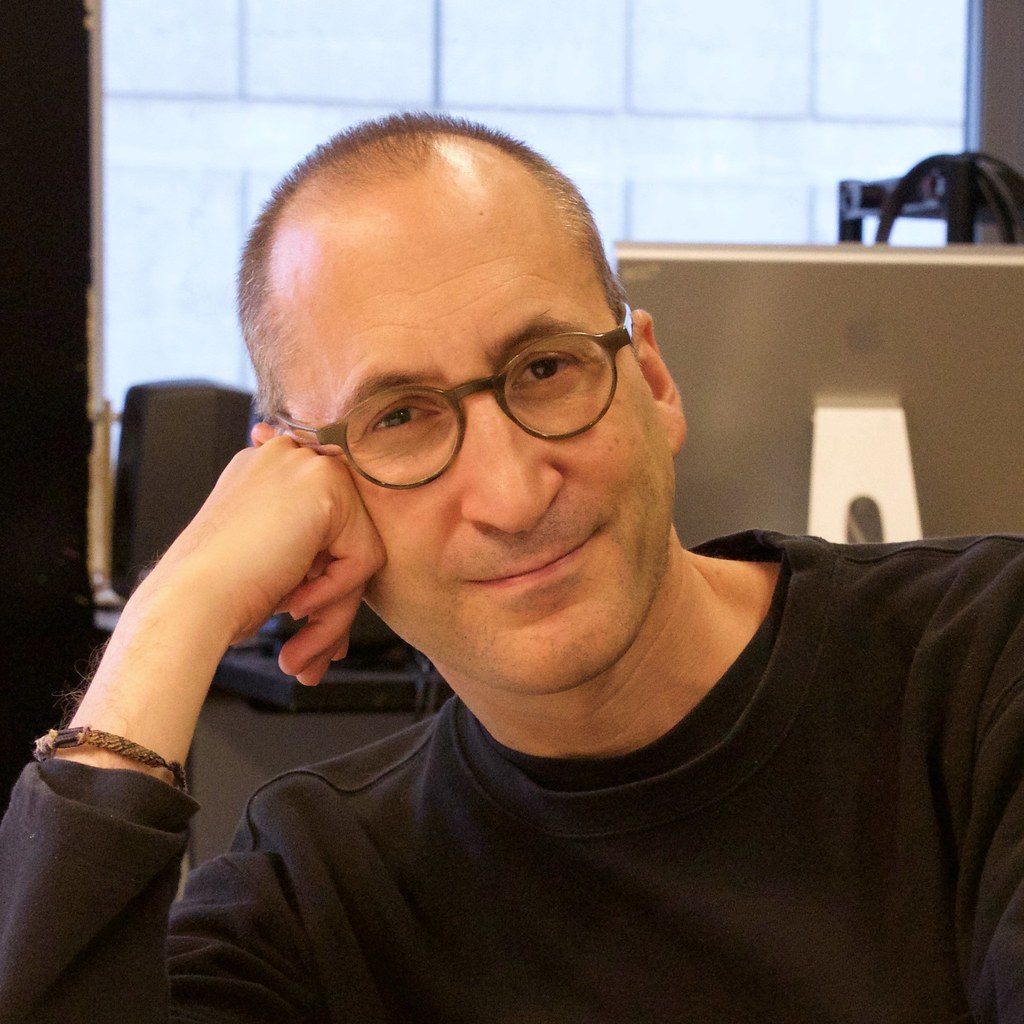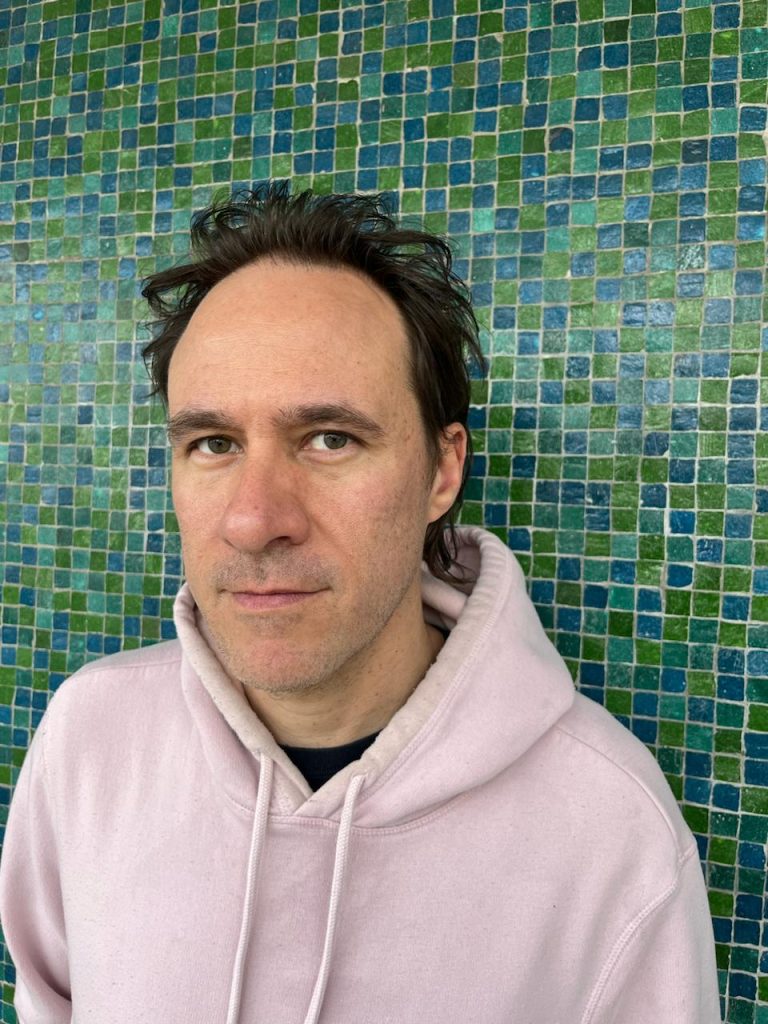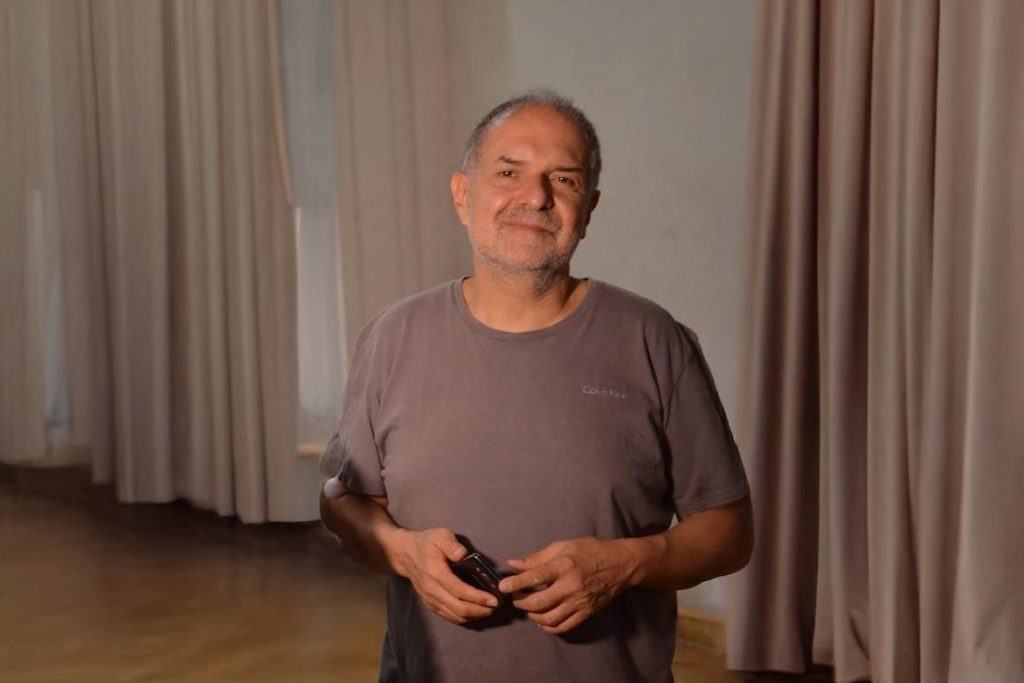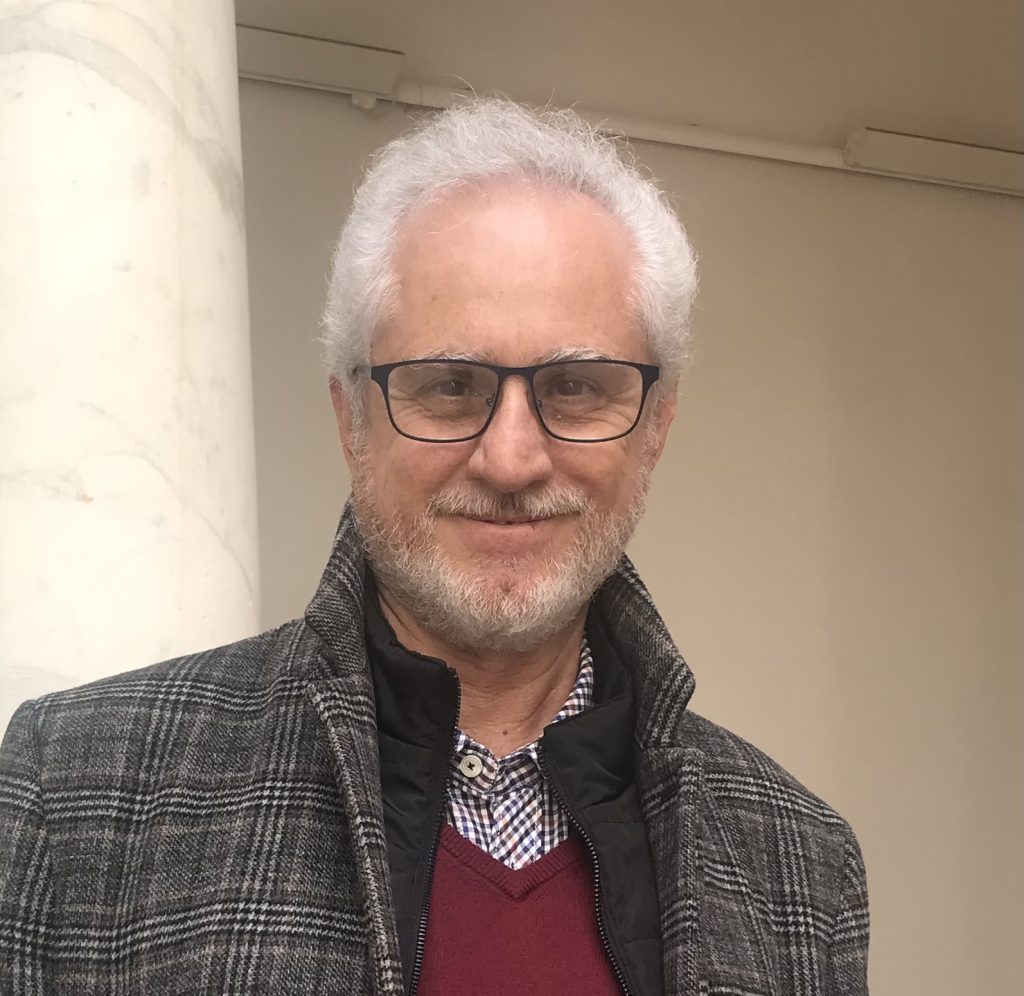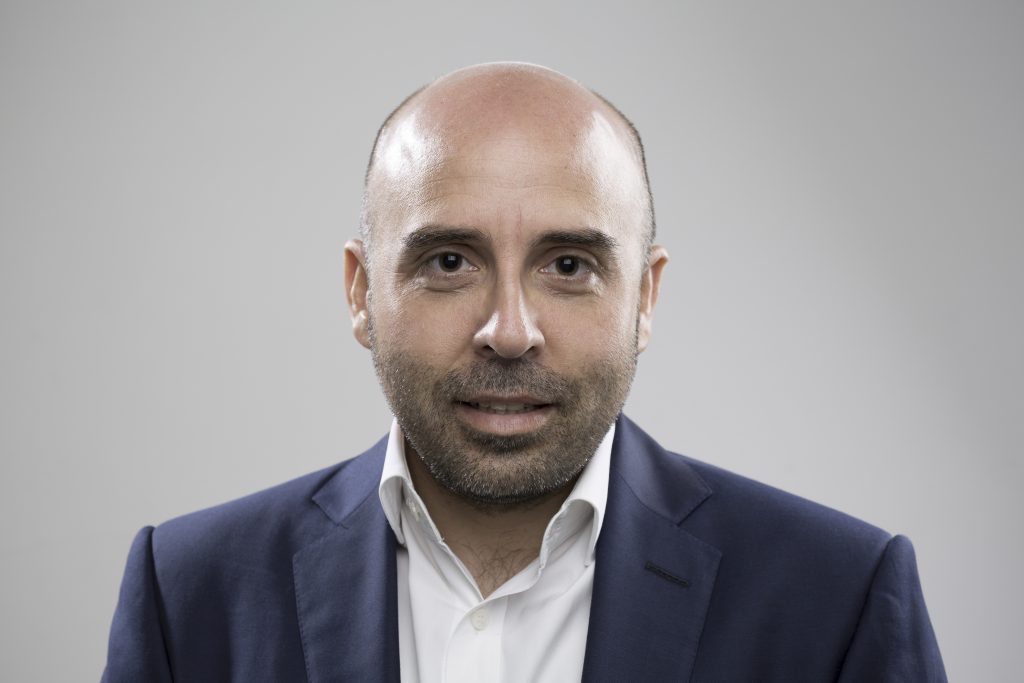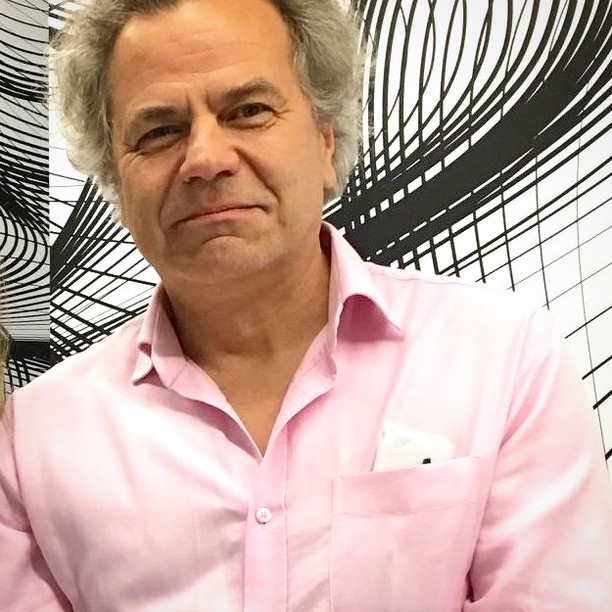Keynotes
Manthia Diawara – A native of Mali, Professor Diawara received his education in France and later traveled to the United States for his university studies. He has taught at the University of California at Santa Barbara and the University of Pennsylvania. He is the author of We Won’t Budge: An African Exile in the World (Basic Civitas Books, 2003), Black-American Cinema: Aesthetics and Spectatorship (ed. Routledge, 1993), African Cinema: Politics and Culture (Indiana University Press, 1992), and In Search of Africa (Harvard University Press, 1998). He has published widely on the topic of film and literature of the Black Diaspora. Professor Diawara also collaborated with Ngûgî wa Thiong’o in making the documentary Sembene Ousmane: The Making of the African Cinema, and directed the German-produced documentary Rouch in Reverse.
Chris Salter – Chris Salter is Professor for Immersive Arts and Director of the Immersive Arts Space at the Zurich University of the Arts (ZHdK). He is also Professor Emeritus, Design and Computation Arts at Concordia University in Montreal and former Co-Director of the Hexagram network for research-creation in arts, cultures and technology and Co-Founder of the Milieux Institute at Concordia. He studied philosophy and economics and completed his PhD in theatre studies with research in computer music Stanford University. His artistic work has been seen all over the world at such venues as the Venice Architecture Biennale, Barbican Centre, Berliner Festspiele, Wiener Festwochen, ZKM, Kunstfest Weimar, Musée d’art Contemporain, EMPAC, Muffathalle, EXIT Festival and Place des Arts-Montreal, among many others.. He regularly presents at national and international conferences, has given invited talks at universities, museums, cultural centres and festivals worldwide and has sat on numerous juries including NIME, ISEA and the Prix Ars Electronica. He is the author of Entangled: Technology and the Transformation of Performance ( 2010), Alien Agency: Experimental Encounters with Art in the Making (2015) and Sensing Machines (2022), all from MIT Press.
Gabriela Aceves – Gabriela Aceves Sepúlveda is a Mexican media artist and historian based in Canada. Her research centres on the histories of women and feminism(s) at the intersection of art, media, science and technology, specifically focusing on Latin American artists. She is the author of the award-winning book Women Made Visible: Feminist Art and Media in post-1968 Mexico (Nebraska Press, 2019) and co-editor of Diffracting the North: Contemporary Latinx Canadian Experiences and Practices in Film, New Media and Visual Arts (Concordia Press, forthcoming). Her academic publications on feminist media art, archival practices, sound studies, research-creation, and Latin American art and its diasporas appear in numerous edited volumes and The Feminist Media Histories Journal, Leonardo Music Journal, Media-N: the Journal of the New Media Caucus, The Journal of Latin American and Latinx Visual Culture, Technoetic Arts: A Journal of Speculative Research, among others. Her research-creation practice concerns the production of collaborative multimedia projects investigating the body as a site of cultural, gendered and techno-scientific inscriptions. Aceves Sepúlveda is an Associate Professor in the School of Interactive Arts and Technology at Simon Fraser University in Canada on the unceded Coast Salish territory of the Sḵwx̱wú7mesh (Squamish), Stó:lō, Səl̓ílwətaʔ (Tsleil-Waututh) and xʷməθkʷəy̓əm (Musqueam) nations. She is the director of the research-creation studio Critical-Media-Art-Studio (cMAS) and teaches media arts production, theory and history.
Esteban Garcia Bravo – Esteban Garcia Bravo, MFA, PhD, is a Colombian-American artist and scholar specializing in computational art, digital media, and public art technology. He is an Assistant Professor of Digital Media Art & Spatial Art at the CADRE Laboratory for New Media at San José State University. Garcia Bravo’s research explores the “lost histories” of early computer art, critically examining aesthetics within media-cultural contexts. His book Cybernethisms (Purdue Press, 2015) investigates the work of computer art pioneer Aldo Giorgini, while his studies on José María Yturralde document Spain’s first computational designs from 1968. His writings appear in leading journals, including Leonardo, The Design Journal, Artnodes, Acoustic Space, and CITAR Journal of Science and Technology of the Arts. His work has been presented at major international conferences such as SIGGRAPH (2011, 2015, 2017, 2022, 2023), ISEA (2012, 2013, 2015, 2017), Media Art Histories (2013), Expressive (2016), and EVA London (2015). In 2022, his research on the preservation of traditional African dances using deep learning techniques won the Best Art Paper Award at SIGGRAPH. Beyond research, Garcia Bravo is actively engaged in the computational art community, serving as a reviewer for ACM SIGGRAPH Art Papers since 2016 and as Art Exhibition Co-Chair for the IEEE Visualization Conference in 2017.
Invited Guests
Jorge la Ferla – Jorge La Ferla is a researcher in arts and audiovisual media with a distinguished academic career across the Americas and Europe. He holds a degree from the University of Paris VIII and a Master of Arts from the University of Pittsburgh. He has served as professor and chair at institutions such as the University of Buenos Aires, the Universidad del Cine, and the University of San Andrés. His work includes seminars, curatorial projects, and publications focused on film, video art, and new technologies. He has edited over 50 influential publications in the field of art and media. In Colombia, he has collaborated with universities such as Javeriana, Los Andes, and Caldas, where he coordinated the edition of El Medio es Diseño Audiovisual. A frequent collaborator of the International Image Festival, he has been awarded the 2025 Media Art Histories Award for his outstanding contribution to the history of media art.
Andrés Burbano – Andrés Burbano is a transdisciplinary artist and historian of media technology. He is an associate professor at the School of Arts and Humanities of the Universitat Oberta de Catalunya (UOC) and holds a PhD in Media Arts and Technology from the University of California. Burbano has been a keynote speaker at several academic events, including MAH 2023, was named chair of ACM SIGGRAPH 2024, and is the author of the book *Different Engines: Media Technologies from Latin America* (Routledge, 2024). Additionally, he serves as co-editor of the journal Artnodes. His creative work has been exhibited at ISEA and Ars Electronica and is part of the permanent collections of ZKM and MEIAC.
José Ramón Alcalá – Professor of Graphic Expression Techniques and Image Technologies. Department of Art. Faculty of Fine Arts of Cuenca. University of Castilla-La Mancha. Artist, researcher, curator, and multidisciplinary thinker, he has been working since the 1980s in the field of art and new media. He has led numerous R&D&I projects and contracts focused on the applications of new technologies in artistic creation, New Media Art, and virtual museography for various organizations and institutions, such as the European Community, the Ministry of Science and Technology, and several Autonomous Communities, as well as for numerous international technology companies and corporations, and Ibero-American artistic and cultural foundations.
José-Carlos Mariátegui – José-Carlos Mariátegui is a writer, curator, educator, and entrepreneur in culture and technology. He studied Biology and Mathematics and holds a Master’s and PhD in Information Systems and Innovation, both from the London School of Economics and Political Science – LSE (London). He is the founder of Alta Tecnología Andina – ATA, an organization dedicated to projects in art, science, and technology in Latin America. He is a professor at LUISS (Rome), a Senior Research Fellow in the Department of Media and Communications at LSE, a Board Member of Future Everything (UK), a Board Member (Kuratorium) of the ZKM Center for Art and Media Karlsruhe (Germany), and a resident at the Rockefeller Foundation’s Bellagio Center (2025). He serves as President of the Education Committee of the Museo de Arte de Lima – MALI, where he also leads its digital strategy. He has published in journals such as *AI & Society*, *Third Text*, *The Information Society*, *Telos*, and *Leonardo*. His multidisciplinary research spans media archaeology, cybernetics, digitization, archives, and the impact of technology on memory institutions. He co-edited a special issue of *AI & Society* on cybernetics in Latin America (2022) and edited the book *Museo Digital: Inteligencias y Artificios* for MUAC (Mexico, 2025). He has curated art and technology projects internationally for over two decades. Recently, he curated: *Rosa Barba: Evoking a Space Beyond Cinema*, Museo de Arte de Lima – MALI, 2024; *ARTEONICA*: Art, Science, and Technology in Latin America Today (with Gabriela Urtiaga and Rodrigo Alonso), MOLAA (California), 2024-2025; and *El Incondicionado Desocultamiento: Las Experimentaciones Audiovisuales de Rafael Hastings*, ICPNA (Lima), 2025.
Oliver Grau – 20 years Chair Professorships in Art History and Image Science at int. Universities. Elected Member of Academia Europaea. More than 350 invited lectures and keynotes at conferences, incl. Olympic Games culture program and G-20 Summit. Grau founded and serves as director of the internationally extensive Archive of Digital Art, ADA: www.archive-digitalart.eu Grau’s “Virtual Art. From Illusion to Immersion”, MIT-Press (Nature & Scientific American Book of the Month) is with 3000+ citations internationally among the most quoted art history books since the year 2000. It offered the first historic evolution in image-viewer theory of immersion and a systematic analysis of the triad of artist, artwork, and beholder in digital art. Grau was founding director and is head of the MediaArtHistories Conference Series board. He received several awards, and his numerous publications have been translated in 15 languages. His main research is in histories of media art, immersive images, art and emotion, the history of artificial life/intelligence and digital humanities. Grau developed new international curricula: MediaArtHistories MA, Image Science, Digital Collection Management, the Erasmus MediaArtsCultures Program is supported by the EU with 5.5 Mio Euro.
Accepted Papers / Presenters
Helena Shaskevich, Paula Perissinotto, José Ramón Alcala Mellado, Jana Horáková, Arturo Cariceo Zuñiga, Shanique Thompson, Haitian Ma, Ricardo Dal Farra, Caitlin Grace, Esteban Gutiérrez Jiménez, Angeliki Poulou, Maurice Jones, Anne-Sarah Le Meur, Georg Eckmayr, Sheila Pinkel, César Capote Cinetismo, Farah Beatriz Leyva Batlle, Manuel Zuñiga, Tadeus Mucelli, Mona, Alexis Ibarra Ibarra, Cynthia Villagómez, Erandy Vergara Vargas, Nina Köll, Nancy Mauro-Flude, Valentina Montero, Marykarla M. Olivares, Tatiana Julio, Darko Fritz, Ana Peraica, Ksenia Fedorova, Edmar Soria, Claudia Mosqueda Gómez, Edmar Olivares Soria, Elena Abbiatici, Claudia Costa Pederson, Pat Badani, Gabriela Aceves Sepúlveda, Jose-Carlos Mariategui, Roger F. Malina, Roberta Buiani, Edgar Hernández Robles, Katerina Quintulem, Cynthia Blanchette, Andrea Camacho, Diana María Mahecha, Patrick M. Lichty, Rafael Ángel Bravo, Jesús Fernando, Monreal Ramírez, Daniel Hora, Laura Palma, María Di Muro, Pellegrino, Sebastian Lomelí Bravo, Martina Zelenika, Alexandre Saunier, Renzo Filinich Orozco, Andamio Colectivo, Jessica Rodríguez, Luis Navarro Del Angel, Harshit Singh, Camila Flores-Fernández, Pablo Andrés Gómez Granda, John Bardakos, Léa Dreyer, Ana Maria Zapata Guzman, Dijana Protić, Emanuela Zilio, Bilyana Palankasova, Manuel Guerrero, Ashley Lee Wong, Stefania de Vincentis, Antonio Rocha, Semay Buket, María Crisóstomo, Esther Monivas, Sophie Carolin Wagner, Ryszard Kluszczyński, Raivo Kelomees, Megan Smith, Najam Ul Assae, Sousan Qadeer, Adam Lockhart, Gregoire Rousseau, Janine Grün, Christoph Klütsch, Sara Molho, Jihoon Kim, Bonnie L Mitchell, Monica Velazquez, Alejandro López Rincón, Leonardo Aranda, Paolo Berti, Paola Lagonigro, Wolfgang Strauss, Paloma González Díaz, Claudia Arozqueta, Mariela Cantú, Ana Gonçalves Magalhães, Giselle Beiguelman, Juan Duarte Regino, Aurora Del Rio, Wolfgang Muench, Andrew Prior, Laura Rosser, Muge Yildiz, Luis Felipe Raguá, Miranda, Regina Rivas Tornés, Felipe Haurelhuk, Eugenio Maklakov, Ioulia Marouda, Adriana La Selva, Inti Gallardo, Iván Terceros Daniil, Budhaditya Chattopadhyay, Cristina Voto, Gabriel Menotti, German Alfonso Nunez, Judit Bodor, Roddy Hunter, Olga Majcen Linn, Nina Sosna, César Augusto Arias Peñaranda, Ricardo Iglesias, Mirosław Filiciak, Melissa deLaney, Fernando Fernandes, Gilbertto Prado, Pablo Gobira, Emanuelle de Oliveira Silva, Lisa Park, Thomas Pausz, Carolina Salguero, Mahzabin Haque, Eveline Wandl-Vogt, Amy Navarrete Soto, Inge Hinterwaldner, Mayte Gómez-Molina, Daniela Hönigsberg, Yannick Westphal, Jiawen Yao, Oliver Grau, Sharath Chandra Ramakrishnan, Mitch Goodwin, Vog, Bronac Ferran, Gisela Domschke, Meredith Hoy, Rafael Ángel Bravo, Gabriel Eduardo Avila Buitrago, Luis Fernando, Medina Cardona, Cristian Villavicencio Ruiz, Ruth Laura Cruz Mendoza, Daniel Rourke, D.A. Restrepo Quevedo, Raquel Caerols Mateo, Maria Luiza Fragoso, J. Ignacio Chaves G. Beatriz E. Múnera B., J. Ignacio Chaves G., Alejandro Brianza, Zhuolin Li, Bena Torres Andean, Camilo Lozano-Rivera, Jorge E. Miceli, Karine Joulie, Luciano Dantas Bugarin, Adriana Mabel, Tim Noble, Anitza Gutiérre, Penestsa Dika, Firas Safieddine, Esteban Garcia Bravo, Rhonda Holberton, Alis Yovana Pataquiva, Mateus, Angela, Liliana Dotor Robayo, Daniel Alejandro, Rodríguez García, Susanne Grabowski, Doris Posch, Ruby Nyaoro, Leslie Deere Wayshowers, Óscar Villota, Juanita Valencia Aristizábal, Juan Alejandro López Carmona, Sebastian López Ospina, Jose Hopkins Brocq, Violeta Vojvodic Balaz, Kate Belakova, Annie Wan, Thomas Pausz; Rosa Menkman; Ingeborg Fülepp, Paula Perissinotto, Violeta Vojvodić Balaz, Derrick de Kerckhove, Anna Maj, Luiz Carlos de Oliveira Ferreira, Eduardo Séllos Rodrigues, Pablo Gobira, Ana Luiza Pedrosa Camilo, Priscila Rezende

